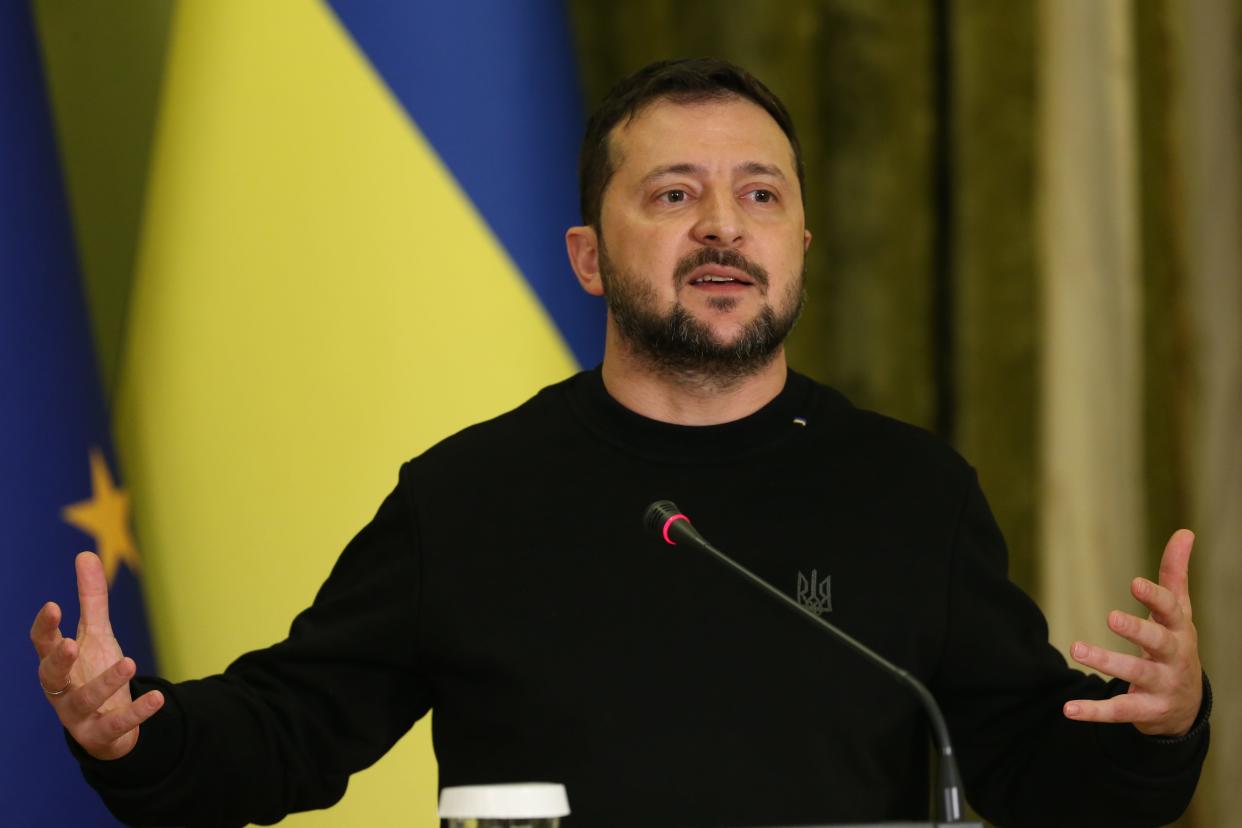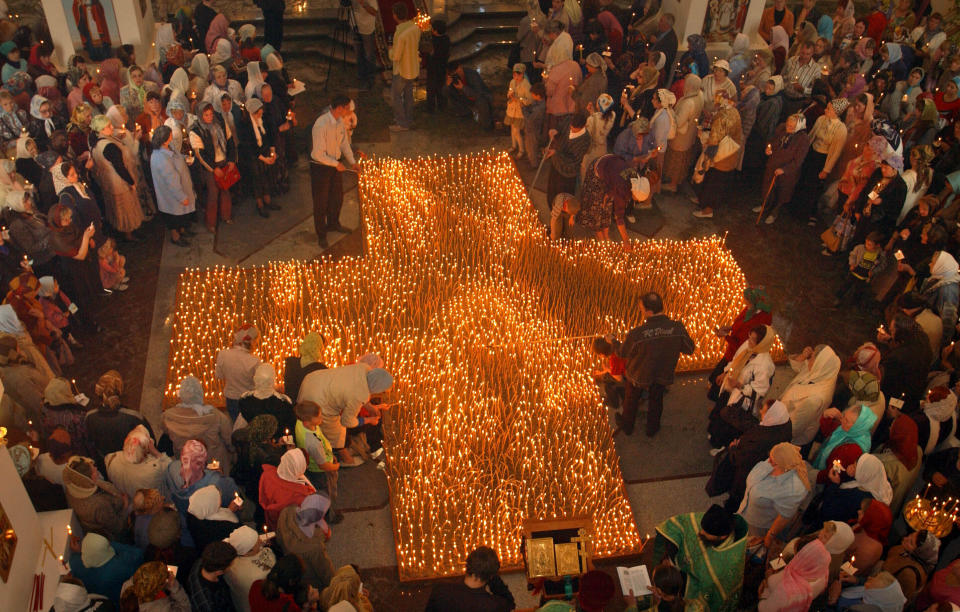Opinion: Why Palestinian Americans believe Rep. Rashida Tlaib spoke the truth
Saree Makdisi
Fri, November 10, 2023

Rep. Rashida Tlaib (D-Mich.) speaks during a rally in Washington on Oct. 20. (Jose Luis Magana / Associated Press)
“I can’t believe I have to say this,” Rep. Rashida Tlaib (D-Mich.) said during the debate over the motion to censure her in Congress this week, “but Palestinian people are not disposable. We are human beings just like anyone else.”
The vote passed Tuesday in the House 234-188. Tlaib powerfully captured the extent to which Palestinians have been silenced and dehumanized in institutions across the United States, even as they are killed and injured thousands of miles away. Indeed, the dehumanization here mirrors the physical destruction in Gaza and the West Bank — and helps to sustain it
Israel has so far killed more than 11,000 people in Gaza, including more than 4,000 children. It has damaged or destroyed half of Gaza’s family homes and bombed hospitals. It has left the territory’s population of 2.3 million people — of whom around half are children — largely cut off from access to food, water, fuel, electricity and medicine.
And the House of Representatives saw this — of all times — as the ideal occasion on which to censure the only Palestinian American member of Congress for having expressed the rights and humanity of her battered but still steadfast people.
Among the reasons cited for censuring Tlaib was a video she shared on social media that included the slogan “from the river to the sea.” The resolution claims this was a “genocidal call.” In fact, variations of the phrase have been used by different parties, including, but not only, Hamas. In Israel’s Likud Party 1977 platform, for example, it was used to express uniquely Israeli sovereignty over all of historical Palestine, a theme also echoed in Israel’s 2018 Jewish Nation-State Law. In today’s context, for Palestinians and others opposing Israel’s system of apartheid, however, the phrase expresses a vision of freedom and equality for all.
In remembering that history, as one group of students recently put it, the phrase is “a call for the end to the oppression of all Palestinians — in Gaza, the West Bank and within the Green Line,” the armistice line between Israel and the West Bank set in 1949. “Liberating all of Palestine requires revolutionary change: not an eradication of Jews from the land, but a total dismantlement of the apartheid regime occupying it.”
Although I have been expressing similar sentiments for over two decades, that particular formulation is not mine: It comes from a group of Jewish students at Brown University expressing their solidarity with Brown Students for Justice in Palestine.
“As we grapple with millennia of Jewish struggle and survival,” they continue, “we will not abandon our Palestinian cousins and peers, or let them stand alone. This genocide cannot continue.”
Read more: Opinion: Even before the bombing of Gaza, generations of Palestinians were displaced from their homes
Tlaib’s censure wasn’t merely an act of gratuitous cruelty. Political figures in both parties have repeatedly made clear their contempt for Palestinian life.
Asked on live television if there is any threshold of civilian loss which might lead the U.S. government to call on Israel to stop its bombing, Sen. Lindsey Graham (R-S.C.) unblinkingly said “no.” Rep. Brian Mast (R-Fla.) questioned whether it was possible to speak of innocent Palestinian civilians at all. And when Florida state Rep. Angie Nixon asked how many dead Palestinians would be enough to justify a cease-fire, her Republican colleague Michelle Salzman immediately shouted out, “all of them!” None of these lawmakers has faced similar censure for their comments, nor are they likely to.
On Oct. 16, Rep. Cori Bush (D-Mo.) introduced a House resolution calling for a cease-fire. It states, “all human life is precious, and the targeting of civilians, no matter their faith or ethnicity, is a violation of international humanitarian law.” Of 435 members of the House, only 12 others were willing to co-sponsor this bill. Not one of them is white. Most of these Black and brown members of Congress had Tlaib’s back and held her for comfort during her speech. The raw racial lines of our country are there for all to see.
“The cries of the Palestinian and Israeli children sound no different to me,” Tlaib said in her speech during the censure resolution debate. “What I don’t understand is why the cries of Palestinians sound different to you all.”
Palestinian Americans feel that official and institutional America are deaf to the cries of Palestinians, and, at best, indifferent to Palestinian suffering of any kind. White House national security spokesperson John Kirby, for instance, has staked out a similar position for President Biden, saying, “we’re not drawing red lines for Israel.”
The same goes for our academic institutions — including my own in Los Angeles, where many Palestinian Americans work as students, faculty or staff — that were lightning-quick to condemn the killing of Israeli civilians on Oct. 7. Yet they have maintained a stony silence even as Israel’s rampant killing of civilians with bombing, which one former UN official and scholars of the Holocaust have said amounts to a campaign of genocidal violence, enters its second month. Silence speaks as powerfully as words themselves, and the message is clear: Some lives matter; others just don’t.
As the English poet Percy Shelley once put it, however, it’s in the absolutely darkest of times that the glorious “Phantom” of freedom bursts forth “to illumine our tempestuous day.”
Hundreds of thousands of ordinary Americans protesting and demonstrating across the country have expressed their affirmation of our common humanity in ways that our institutions and government somehow seem to find impossible. Above all, young people and especially students on campuses — who have bravely shrugged off an orchestrated campaign of intimidation and doxxing intended to silence them — have rallied to the cause of Palestine, which they now recognize is also the cause of justice.
I, like many other Palestinians, have long been ready to embrace our Jewish cousins on these principles, in the name of dismantling apartheid and working toward a democratic and secular state of equal citizens — and in the name of our common humanity, which alone can save us in the end.
Saree Makdisi is a professor of English and comparative literature at UCLA.
This story originally appeared in Los Angeles Times.
Karoun Demirjian and Liam Stack
Fri, November 10, 2023

Rep. Rashida Tlaib (D-Mich.), center, during a bipartisan candlelight vigil with members of Congress, held to commemorate one month since the Oct. 7 attacks by Hamas in Israel, on the steps of the Capitol in Washington, Nov. 7, 2023.
WASHINGTON — When House Republicans and a solid bloc of Democrats banded together this week to censure Rep. Rashida Tlaib, D-Mich., for her statements about the Israel-Hamas war, they homed in on her embrace and defense of one pro-Palestinian slogan they called unacceptable: “from the river to the sea.”
The official congressional rebuke of Tlaib, the only Palestinian American in Congress, said the phrase was “widely recognized as a genocidal call to violence to destroy the state of Israel.” The top White House spokesperson disavowed it from the West Wing, saying that it was “divisive” and that many considered it hurtful and antisemitic.
The phrase, which Tlaib has defended as “an aspirational call for freedom, human rights and peaceful coexistence, not death, destruction or hate,” has not only become a flashpoint for dispute in Washington; it has echoed across college campuses and in cities throughout the country in recent weeks as pro-Palestinian activists protest the heavy civilian toll of Israel’s war against Hamas. The slogan has prompted charges of antisemitism and fueled an increasingly bitter debate over the conflict, its root causes and how it should be waged — and what position the United States should be taking as it rages on.
The decades-old phrase has a complicated backstory that has led to radically different interpretations by Israelis and Palestinians — and by Americans who support them.
“The reason why this term is so hotly disputed is because it means different things to different people,” said Dov Waxman, a professor of Israel studies at UCLA, adding that “the conflicting interpretations have kind of grown over time.”
The phrase “from the river to the sea” — or in Arabic, “min al-nahr ila al-bahr” — dates to the dawn of the Palestinian nationalist movement in the early 1960s, about a quarter-century before Hamas came into existence. It gained popularity within the Palestine Liberation Organization, or PLO, as a call for returning to the borders under British control of Palestine, where Jews and Arabs had both lived before the creation of Israel as a Jewish state in 1948.
The slogan reflects the geography of that original claim: Israel spans the narrow stretch of land between the Jordan River and the Mediterranean Sea. But the phrase’s popularity persisted even as territorial claims shifted, after the PLO entered peace negotiations in the 1990s, formally recognizing Israel’s right to exist and coming to governance through the creation of the Palestinian Authority.
For many Palestinians, the phrase now has a dual meaning, representing their desire for a right of return to the towns and villages from which their families were expelled in 1948, as well as their hope for an independent Palestinian state, incorporating the West Bank, which abuts the Jordan River, and the Gaza Strip, which hugs the coastline of the Mediterranean.
“When they’re using that phrase, it’s a very personal one for them,” said Maha Nassar, an associate professor of Middle Eastern history at the University of Arizona. “They’re saying, ‘I identify with my ancestral home in Palestine, even if it’s not on a map today.’
“Also, it’s an insistence on Palestinians and Palestine being unified,” she added.
But the phrase has also been adopted over the years by Hamas, which calls for the annihilation of Israel, taking on a darker meaning that has long shaped the way in which it is received.
That has only intensified in the wake of Hamas’ Oct. 7 attack on southern Israel, in which the group killed more than 1,400 civilians and soldiers, the largest single-day slaughter of Jews since the Holocaust, and took hundreds of others hostage. Gaza’s health ministry, which is run by Hamas, says that more than 10,000 Palestinians have been killed in Israeli strikes since.
“It is an antisemitic charge denying the Jewish right to self-determination, including through the removal of Jews from their ancestral homeland,” according to the Anti-Defamation League.
In a post on X, formerly known as Twitter, this week, the ADL, a Jewish advocacy group that fights antisemitism and discrimination, wrote, “‘From the River to the Sea’ is a Hamas call to annihilate Israel,” adding that “claiming it is a rally of coexistence gives cover to terror.”
Many members of Congress, including dozens of Democrats, endorsed a similar view this week as they condemned Tlaib for her comments.
The slogan does not appear in Hamas’ founding covenant from 1988, which pledges “to confront the Zionist invasion and defeat it,” not just in historic Palestinian territory but worldwide. It is featured, however, in a section of the group’s revised platform from 2017. In the same paragraph, Hamas indicates it could accept a Palestinian state along the borders that were in place before the 1967 war — the same borders considered under the Oslo Accords.
Still, Hamas’ firm commitment not to recognize Israel under any conditions has solidified the impression to critics that whoever repeats the slogan is participating in a rallying cry for the destruction of Israel — and by extension, of the Jewish people as well.
“The phrase ‘Palestine will be free from the river to the sea’ suggests a vision of the future without a Jewish state, but it does not answer the question of what the role of Jews would be,” said Peter Beinart, a professor at the City University of New York. He added that the meaning of the phrase, however, “depends on the context.”
“If it’s coming from an armed Hamas member, then yes, I would feel threatened,” said Beinart, who is Jewish. “If it is coming from someone who I know has a vision of equality and mutual liberation, then no, I would not feel threatened.”
Many Palestinians have been dismayed over the outrage about the slogan, which they regard as the result of an orchestrated effort by groups like the ADL to impugn the motives of Palestinians as a means of undermining their cause of statehood and silencing them.
“It is perfectly possible for both people to be free between the river and the sea,” Ahmad Khalidi, a researcher at Oxford University who worked on Arab-Israeli peace negotiations during the 1990s, said of Palestinians and Jews. “Is ‘free’ necessarily in itself genocidal? I think any reasonable person would say no. Does it preclude the fact that the Jewish population in the area between the sea and the river cannot also be free? I think any reasonable person would also say no.”
Khalidi pointed out that Israel’s Likud party, which is led by Prime Minister Benjamin Netanyahu, embraced a similar slogan in its original 1977 platform, which stated that, “between the Sea and the Jordan there will only be Israeli sovereignty.” That phrase also could be seen “as having a malign intent,” he said.
Likud has since dropped the phrase, though the party has opposed a two-state solution in which Palestinians would have a recognized state alongside Israel. And in 2018, Netanyahu’s governing coalition pushed through a law that enshrined the right of national self-determination in Israel as “unique to the Jewish people.”
c.2023 The New York Times Company
'From the river to the sea': Why is the Palestinian nationalist slogan about Gaza a flashpoint?
SARAH BETH HENSLEY
Fri, November 10, 2023
When the House this week voted to censure Democratic Rep. Rashida Tlaib, accusing her of calling for Israel's destruction, her critics said it was in part because she repeated the Palestinian nationalist slogan, "from the river to the sea."
The phrase, perhaps unfamiliar to many Americans, has been around for decades, before the militant group Hamas even existed, and continues with the words, "Palestine will be free."
It has now become both a rallying cry for Palestinian rights chanted by supporters worldwide -- and what others consider offensive code for wiping Israel off the map, between the Jordan River and the Mediterranean Sea, as Hamas has vowed to do.
MORE: Rep. Rashida Tlaib censured by House over Israel comments

PHOTO: A protester holds a placard reading 'From the river to the sea, we demand equality', during a protest in solidarity with Palestinians, in Berlin, Germany, Nov. 4 2023. (Clemens Bilan/EPA-EFE/Shutterstock)
Hamas, designated a terrorist organization by the U.S., adopted the phrase in its 2017 charter. The group's brutal attack on Israel on Oct. 7 caused the horrific deaths of 1,400 men, women and children, according to Israeli officials.
That, as the world has seen in grim detail since, set off the current war in the neighboring Gaza Strip, where more than 10,000 people have been killed, many of them innocent civilians, including thousands of children buried under blasts from Israeli bombs, according to the Hamas-run Gaza Health Ministry.
What Tlaib said she meant
Tlaib, the first Palestinian-American woman in Congress, posted on X that the entire phrase is "an aspirational call for freedom, human rights, and peaceful coexistence, not death, destruction, or hate," explaining why she posted a video to X of protesters chanting the phrase. Later in that video she accused President Joe Biden of supporting a Palestinian "genocide."

PHOTO: Rashida Tlaib post from X. (@rashidatlaib/X)
Tlaib has posted on X and said in interviews that she does not support Hamas, does not want to eradicate Israel and does not want to eradicate Jews.
Her defenders say she shouldn't be punished for exercising free speech even if they don't agree with it -- and note she didn't explicitly call for Israel's eradication.
The Anti-Defamation League has rejected that explanation, calling the phrase antisemitic -- saying it's a "charge denying the Jewish right to self-determination, including through the removal of Jews from their ancestral homeland."
House Republicans repeatedly rebuked Tlaib for using the phrase during the debate over her censure.

PHOTO: Rep. Ilhan Omar comforts Rep. Rashida Tlaib as she speaks on the House floor on Nov. 7, 2023, in Washington, D.C. (House of Representatives TV)
"When [Tlaib] chants 'from the river to the sea,' she believes it. Otherwise, she would never repeat that vile, vile statement" shouted Rep. Mike Lawler, a New York Republican.
GOP Rep. Jeff Van Drew of New Jersey said that a line had to be drawn over what is considered acceptable speech.
"We don't entertain hate in this Congress, we confront it," Van Drew said.
Even 70 of Tlaib's fellow House Democrats, many Jewish, signed a letter on Tuesday blasting her use of the slogan.
"We reject the use of the phrase 'from the river to the sea' -- a phrase used by many, including Hamas, as a rallying cry for the destruction of the State of Israel and genocide of the Jewish people," the Democratic lawmakers said.
House Minority Leader Hakeem Jeffries released a statement condemning what Tlaib said, but not personally denouncing the Michigan congresswoman.
MORE: 'Nobody's hands are clean': Obama breaks with Biden on how to support Israel
"Echoing slogans that are widely understood as calling for the complete destruction of Israel -- such as from the River to the Sea -- does not advance progress toward a two-state solution. Instead, it unacceptably risks further polarization, division and incitement to violence," Jeffries wrote.
"As public officials serving in Congress, the words we choose matter," Jeffries continued.
White House press secretary Karine Jean-Pierre called the phrase "divisive" during Wednesday's press briefing.
"Many find it hurtful, and also, many find it antisemitic. And so, obviously, we categorically reject applying the term to this conflict," Jean-Pierre said.
Where did the phrase and its meaning originate?
There are many deep, complex and historical roots associated with "from the river to the sea," an expert ABC News spoke with said.
"Everything related to the Middle East conflict is complex. And part of the complexity is that you have multiple perspectives, and narratives about those perspectives," said Ezzedine Fishere, senior lecturer in Middle Eastern Studies Program at Dartmouth College.
While the phrase literally means from the Jordan River to the Mediterranean Sea, it symbolizes control over the territory within those Israeli borders and the fight for it to be a homeland for only one nation, said Fishere, who has served as a diplomat in the region, spending five years in Israel, Gaza and Palestinian territories.

Israel & Palestinian Territories as referred to in “From the River to the Sea” (ABC News)
MORE: Israel-Gaza live updates: Mass exodus from Gaza hospital
"So, the conflict is over a land. And it's a conflict between two nationalisms, each of which has a claim on this land," Fishere said of Israelis and Palestinians.
Israeli Prime Minister Benjamin Netanyahu's right-wing Likud party used the phrase in its party platform in 1977 to mean one nation, one state, one sovereignty: Israel. Palestinians, however, adopted it to mean one state: Palestine. So, "neither side is willing to share," Fishere said.
"From river to sea -- the question then becomes, do we have one state or two? Is it a home for two nations? Or is it a home for one nation? And if we say it's a home for one nation, what happens to the other nation? That is the question. … That was the question back then; it's the question today," he said.

PHOTO: Evacuating residents pass a destroyed building following Israeli air strikes in the northern Gaza Strip, Nov. 7, 2023. (Mohammed Saber/EPA-EFE/Shutterstock)
Fishere said there are differing degrees of the phrase. Some versions are more harmonious in nature, where one nation has sovereignty, but the other nation can stay and inhabit the land as residents or citizens -- as long as they behave. For others, it means the opposing nation must move somewhere else. The worst version may be more "genocidal" and endorse the killing of the other nation, he added. Hamas uses the phrase in the "crudest way possible" to signal a fight to eradicate Israelis, which they are willing to wage until the "end of days," Fishere said.
"If it's used by Palestinians, it's directed to the other side. If it's used by an Israeli, it's directed to the Palestinians," Fishere said.
The American Jewish Committee says the phrase calls for the establishment of a State of Palestine -- by erasing Israel and its people.

PHOTO: Palestinians inspect the damage of a destroyed mosque following an Israeli airstrike in Khan Younis refugee camp, southern Gaza Strip, Nov. 8, 2023. (Mohammed Dahman/AP)
"There is of course nothing antisemitic about advocating for Palestinians to have their own state. However, calling for the elimination of the Jewish state, praising Hamas or other entities who call for Israel's destruction, or suggesting that the Jews alone do not have the right to self-determination, is antisemitic," AJC wrote on its website.
For many Palestinians, it's a rallying cry that harkens back to their being expelled from the region with the establishment of Israel in 1948.
In 2018, Maha Nassar -- a Palestinian American and a scholar of Palestinian history -- wrote that the phrase represents the freedom Palestinians seek -- not an effort to disparage Israelis.
The phrase, which grew popular in the 1960s, was "part of a larger call to see a secular democratic state established in all of historic Palestine. Palestinians hoped their state would be free from oppression of all sorts, from Israeli as well as from Arab regimes," Nassar wrote.
Fishere said the phrase is emblamatic of a "repetitive" and "heartbreaking" conflict.
"It is so obvious that, you know, nobody's going anywhere. So, either … they share or they fight -- there is no third way," Fishere said.
The phrase goes beyond the current conflict
"From the river to the sea" has become a popular chant at many pro-Palestinian protests -- something Fishere said he attributes to the perception of Israel's involvement in what critics call "settler colonialism."
"Many of [the protesters] are just coming from different backgrounds, including Americans who have zero connection to the Middle East, but they are revolted by what they see as a settler colonial enterprise that continues -- and that links up with other movements that are opposed to colonialism, and, you know, native rights and so on," Fishere said. "And in their view, 'from the river to the sea' captures that desire to undo settler colonialism."

PHOTO: People, including one holding up a sign that reads: 'From the River to the Sea', attend a 'Freedom for Palestine' protest that drew thousands of participants on Nov. 4, 2023, in Berlin, Germany. (Sean Gallup/Getty Images)
However pure protesters' motivations may be, Fishere warns "that history cannot be undone."
"You cannot rewind the reel back to 18 A.D. and then redirect the players to, you know, [do] the following scenes different -- you can't change the script. You can only go forward from where we are," he said.
Fishere said those who use the phrase should consider what it means for the other side: "What's the next move for the other when this is what you're advocating? What do you want the other side to do?"
"When you say there is no place for Palestinian self determination in this land, what do you expect the Palestinians to do? Or feel? Does this make them more willing to live with you? Does this make them more willing to accept you? The same thing applies to the Palestinians when you say this, does this make all those millions [of Israelis] ... more [willing]?"
MORE: Blinken says 'far too many' Palestinians have died as Israel wages relentless war on Hamas
Tlaib's use of the phrase may be more polarizing than unifying, Fishere said.
"When I say this, and the majority of Israeli Jews hear it as genocidal intent, does this make them really interested in my co-existence? ... Or does this make them more belligerent and antagonistic?" Fishere asked of Tlaib.
Fishere said if a phrase is used in a specific way for decades, it "becomes very hard to kind of take that slogan and redefine it on an individual level."
"Now I heard Rep. Talib saying that she means she has developed this meaning that it means freedom for all -- everybody, from rivers to sea, and so on. And it's a very commendable definition. But it is not the common definition. And that begs the question about, you know, can you use a sentence that's already used in a certain way and then have your own definition of it?" Fishere said. "That's not for me to answer."
'From the river to the sea': Why is the Palestinian nationalist slogan about Gaza a flashpoint? originally appeared on abcnews.go.com
Netanyahu salutes Congress for Tlaib censure
Tara Suter
Thu, November 9, 2023

Israeli Prime Minister Benjamin Netanyahu praised the recent censure of Rep. Rashida Tlaib (D-Mich.) in a Thursday interview on Fox News.
“[W]hat this congresswoman is calling for, is policide and genocide, the elimination of the Jewish state, the one and only Jewish state of the Jewish people,” Netanyahu told Fox News anchor Bret Baier.
“So, that’s absurd, and I salute the Congress for [censuring] her,” Netanyahu continued.
Tlaib was censured Tuesday for her criticism of Israel amid its conflict with the Palestinian militant group Hamas. Twenty-two of her Democratic colleagues joined a majority of House Republicans in the vote to censure the Michigan Democrat.
In a video posted to X, the platform formerly known as Twitter, over the weekend, Tlaib said that President Biden “supported the genocide of the Palestinian people.” The video also featured clips of protestors chanting “from the river to the sea,” a phrase the Anti-Defamation League characterizes as antisemitic. She also defended the use of the phrase in a following post.
The Michigan Democrat earned criticism from both sides of the political aisle for her remarks. In a statement, House Minority Leader Hakeem Jeffries (D-N.Y.) criticized Tlaib’s use of the phrase, saying it is “widely understood as calling for the complete destruction of Israel” and “unacceptably risks further polarization, division and incitement to violence.”
Netanyahu also slammed her use of the phrase, saying, “‘From the river to the sea’ means there’s no Israel.”
Tlaib became the second Democrat and lawmaker to get censured this year, following California Rep. Adam Schiff’s (D) censure in June for his work in opposition of former President Trump.
“We are human beings just like anyone else,” Tlaib said in remarks trying to defend herself from censure Tuesday, holding up a photo of her grandmother. “My grandmother, like all Palestinians, just wants to live her life with freedom and human dignity we all deserve. Speaking up to save lives, Mr. Chair, no matter faith, no matter ethnicity, should not be controversial in this chamber.”
Netanyahu hails censure of Rashida Tlaib
Michelle Del Rey
Fri, November 10, 2023
Israeli Prime Minister Benjamin Netanyahu voiced his support for the censorship of Democratic US Representative Rashida Tlaib in a Fox News interview.
“I salute the Congress for censoring her,” the official told the network’s Bret Bair, asserting that Ms Tlaib was calling for “policide” and “genocide”, including the“elimination of the Jewish state”.
On Tuesday, the US House of Representatives voted 234 - 188 to censure Ms Tlaib, the country’s first Palestinian-American member of Congress, over language some considered to be antisemitic, including the use of the phrase “From the river to the sea, Palestine will be free”, which Ms Tlaib said in a social media post.
The chant refers to the stretch of land spanning from the border of the Jordan River to the Mediterranean Sea, where Israel is located. Mr Netanyahu argued that the phrase advocates for the dismantling of his country.
It “means there’s no Israel,” he said.

Israeli Prime Minister Benjamin Netanyahu looks on as the US Secretary of State gives statements to the media inside The Kirya, which houses the Israeli Defence Ministry, after their meeting in Tel Aviv on October 12, 2023. (POOL/AFP via Getty Images)
Previously, Michigan Attorney General Dana Nessel and state Senator Jeremy Moss asked the Michigan Congresswoman to refrain from using language that might incite violence and fuel hate crimes.
A censure is not the same as expulsion. According to the US House of Representatives, it’s considered to be a “deep disapproval of member misconduct”. To censure a member, the House only needs a majority of members to pass a vote.
Responding to the criticism, Ms Tlaib said the phrase is “an aspirational call for freedom, human rights, and peaceful coexistence,” in a written statement posted to X, formerly known as Twitter. “Not death, destruction, or hate.

Rashida Tlaib chokes up condemning resolution to censure her over Israel comments (US Pool)
“My work and advocacy is always centred in justice and dignity for all people no matter faith or ethnicity.”
More than 10,000 Palestinians have died since the war began last month. Hamas, a terrorist organisation operating in Palestine, launched a series of violent surprise attacks against Israel, resulting in the deaths of 1,400 individuals, mostly civilians.
After the assaults, Mr Netanyahu declared war against Palestine, which has mostly been concentrated in the Gaza Strip.
While human rights organisations, politicians, and demonstrators across the world have called for a ceasefire, Mr Netanyahu reiterated that his country would not be backing down from the fight.
“We’re going to continue until we eradicate Hamas,” he said.















